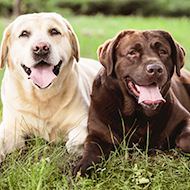New DNA testing schemes for Labrador retrievers approved

The tests screen for two inherited eye disorders in Labrador retrievers.
Two new DNA testing schemes for Labrador retrievers have been announced by the Kennel Club following consultation with the respective breed health coordinators.
The tests screen for macular corneal dystrophy and Stargadt’s disease - two inherited eye conditions that lead to problems with sight. Results will be added to the dog's registration details, triggering the publication of the result in the next available Breed Records Supplement and on the Health Test Results Finder.
“The Kennel Club constantly reviews DNA testing schemes in conjunction with breed clubs to ensure that breeders are supported with resources which help them to make responsible breeding decisions,” explained Dr Joanna Ilska, genetics and research manager at The Kennel Club.
“The Kennel Club works alongside breed clubs and breed health coordinators in a collaborative effort to improve the health of pedigree dogs and is happy to consider a club's request to add a new DNA test to its lists. A formal request from the breed's health coordinator or a majority request from the breed clubs is normally required to do this.”
Dogs affected by macular corneal dystrophy experience a build-up of carbohydrates causing the eye surface to become cloudy. The eyes become more clouded as the condition progresses, which affects their vision.
Stargadt’s disease affects the light-sensing parts of the eyes, causing them to deteriorate and cause vision loss, dilated pupils and a reduced response to light. The condition usually worsens with age but does not usually cause complete blindness.
The diseases are described as autosomal-recessive, meaning that a dog must inherit two copies of an abnormal gene (one from its mother and one from its father) before its health is affected.
To find out which laboratories The Kennel Club can record results from and which labs will send the results direct to The Kennel Club, visit thekennelclub.org.uk/mcd and thekennelclub.org.uk/stgd



 The RCVS has announced a new version of its 1CPD mobile app, with enhanced features for veterinary surgeons and veterinary nurses to record their continuing professional development.
The RCVS has announced a new version of its 1CPD mobile app, with enhanced features for veterinary surgeons and veterinary nurses to record their continuing professional development.